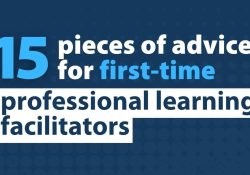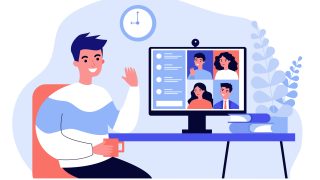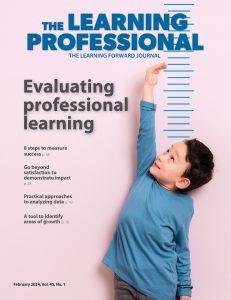Educators today have a heightened sense of urgency and stress during this unusual time. While they first worry about their own family and loved ones, they next worry about their students’ social, emotional, and academic well-being and success. Educators, like other adults, are asking questions about their lives, social interactions, and work and they seek answers to those questions. They also crave personal and professional connections to share stories, seek others’ perspectives, remind themselves they are not alone, and have opportunities to build on each other’s strengths.
In these times, there are multiple forms of professional learning to support educators’ continuous growth. Access to professional learning is particularly crucial for educators to lead, teach, and coach in remote contexts and to maintain their own professional networks to share workloads and cultivate best practices.
When educators can’t gather for more traditional, in-person learning, technology offers multiple opportunities to implement and sustain professional learning. Essentially there are three overarching approaches to facilitating and supporting professional learning in these times.
- Recommend and offer access to high-quality providers of online programs, webinars, and courses. These providers may include university and education agency MOOCs or courses such as Coursera, a collaborative of leading universities that offer access to courses from leading scholars in nearly every field, programs available from or vetted by professional associations (such as Learning Forward), district-developed programs, and those from for-profit entities.
- Engage in collaborative learning to enhance their work. Educators can gather in online learning communities to learn and apply their learning to their own work context. Teachers often express desire for more time to write or tune-up units or courses of study, to design common assessments, and to identify more accommodations for differentiating instruction. Principals and central office staff might use this time to read and discuss texts about leadership in small groups. Content specialists are rarely able to gather teachers to contribute to curriculum review, common assessment redesign, or routine updates. Nearly all educators lack sufficient time to gather to analyze and interpret data and to use their learning to adapt programs and practices. Gatherings such as these are all possible with easily available platforms that accommodate large- and small-group connections.
- Encourage self-organized learning individually or in small teams. Nearly all educators have inquiries about their professional practice they want to pursue. They can self-organize into a team or design an independent study focused on answering a set of inquiry questions or to redesign courses or units of study. They might hold book studies. Principals and central office staff frequently express a lack of time for professional reading about leadership, school management, content, and community relations. Teachers may want to read that new book about best instructional practices for English language learners. They may want to access video tutorials on tools and practices they want to integrate into their own practice. Educators may want to write the article they have always wanted to write. If individual learning is occurring, perhaps teams of teams might meet periodically to have a share fair with each other to spread their learning to others.
While there are many options available, effectiveness, relevance to performance expectations, and impact from implementation are priority criteria for selecting and engaging in professional learning.
And just as with all professional learning, to be high-quality, any educator learning is connected to individual, team, school, and district goals. Supervisors might hold calls with or ask for a brief plan with outcomes identified for professional learning. They might meet online to check in with supervisees about their learning and ask how educators will apply what they are learning to improve their own practice and student success.
So while we are all engaged in remote work, this is a prime time to learn. Being purposeful and intentional in how we allocate resources to support professional learning that is driven by student and educator needs now will keep educators connected to one another, focused on their own continuous improvement, and cultivate collective responsibility for student success.








